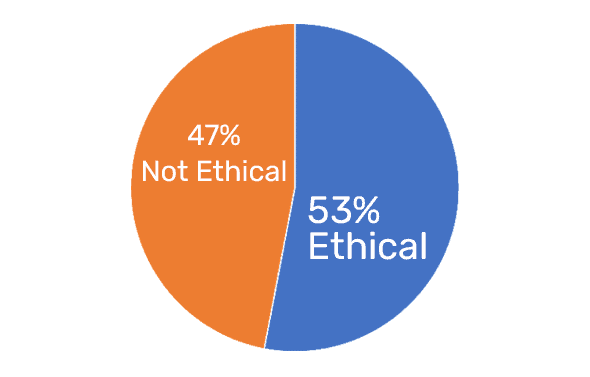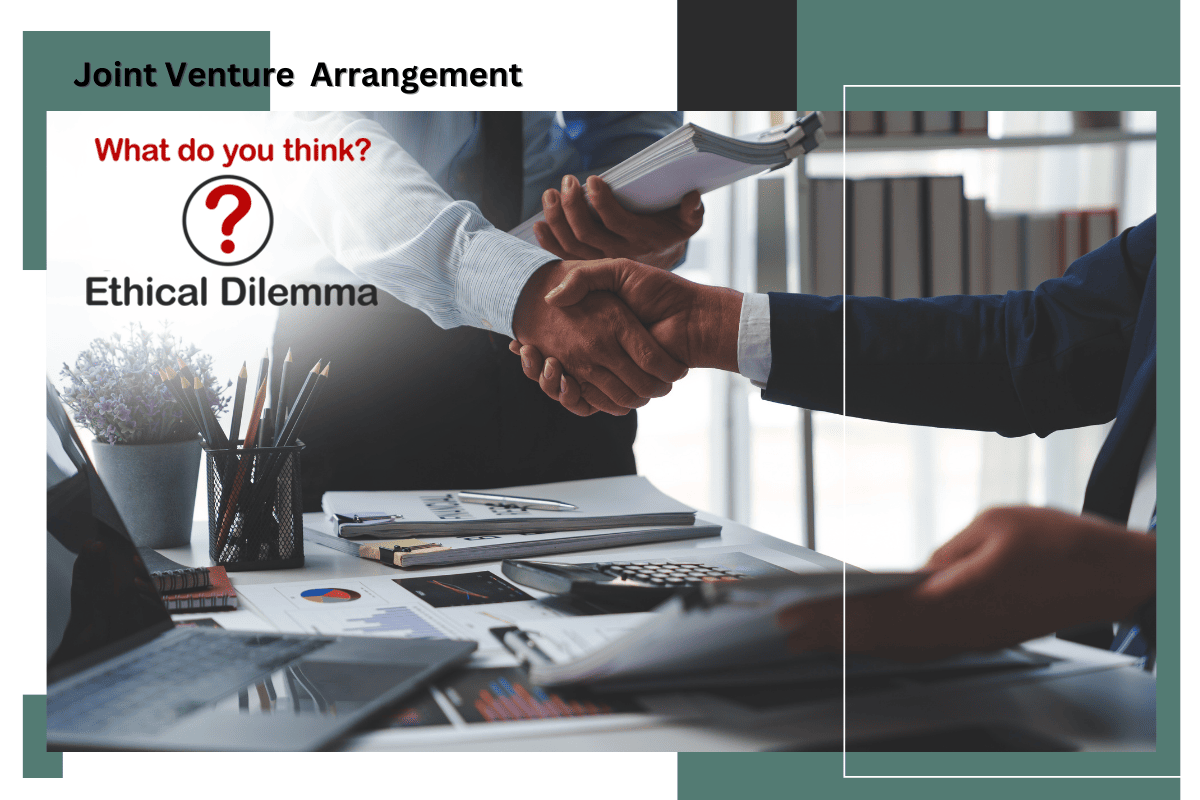This is the February 2024 edition of our monthly series of Ethics case studies titled What Do You Think? This series is comprised of case studies from NSPE archives, involving both real and hypothetical matters submitted by engineers, public officials and members of the public.
Your peers and the NSPE Board of Ethical Review have reviewed the facts of the case as shown below. And, here are the results.
Your opinion has been registered for the February 2024 edition of our monthly series of Ethics case studies titled What Do You Think?
Your vote is recorded as:

Want to know how your peers voted? We’ll send you an email with the poll results on February 27.
Your opinion has been registered for the February 2024 edition of our monthly series of Ethics case studies titled What Do You Think?
Your vote is recorded as:

Want to know how your peers voted? We’ll send you an email with the poll results on February 27.
A Review of the Facts
Engineer Able, on behalf of the firm of which he is a principal, submitted a statement of qualifications to a governmental agency for a project. In due course he was notified that his firm was on the “short list” for consideration along with several other firms, but it was indicated to him that his firm did not appear to have qualifications in some specialized aspects of the requirements, and that it might be advisable for the firm to consider a joint venture with another firm with such capabilities. Engineer Able thereupon contacted Engineer Baker, a principal of a firm with the background required for the specialized requirements, and inquired if the Baker firm would be interested in a joint venture if Able was awarded the job. The Baker firm responded in the affirmative.
Thereafter, Engineer Carlson, a principal in a firm which was also on the “short list,” contacted Engineer Baker and indicated the same requirement for a joint venture for specialized services, and also asked if the Baker firm would be willing to engage in a joint venture if the Carlson firm was selected for the assignment. Baker also responded in the affirmative to Carlson but did not notify Able of his response to Carlson.
What Do You Think?
Is it ethical for Engineer Baker to agree to participate in a joint venture arrangement with more than one of the several since he did not make a full disclosure to all of the firms?
Here is the result of our survey of your peers:

Applicable NSPE Code References:
III.1.
Engineers shall be guided in all their relations by the highest standards of honesty and integrity, andII.4
Engineers shall act for each employer or client as faithful agents or trustees.IV.A
Engineers shall disclose all known or potential conflicts of interest that could influence or appear to influence their judgment or the quality of their services.
Discussion
As is often the case in a particularized set of facts, the code does not specifically address the question, but we have the latitude to read related sections of the code to apply within reasonable limits. On that basis, we believe that Code 8 on conflicts of interest and Code 1 on professional integrity are stated broadly enough to provide a basis for an opinion.
The thrust of Code 8 is to require full and complete disclosure of known or potential conflicts of interest, but it does not necessarily rule out such conflicts if they exist. If there was objection by any party, the ethical question would have to be determined under the pertinent facts of that case.
We do not have to reach that question in this case, however, because there is not a conflict of interest under the facts before us. The code does not define “conflict of interest,” nor do our previous cases provide a definitive statement of its intent or meaning. At the very least, however, as stated in Case 67-1, it means that “a professional person may not take action or make decisions which would divide his loyalties or interests from those of his employer or client.”
In this case there is no potential or actual division of loyalty as to either the Able or Carlson firm on the part of Baker. Assuming that Baker is willing to work out a joint venture agreement with either firm which might secure the contract his loyalty would be centered only with the one selected firm. As a joint venturer, in fact, he would be a party to a single legal entity (the joint venture) for the one contract.
Technically, the disclosure requirement of Code 8 would not mandate that Baker advise Able of the contact from Carlson or advise Carlson that he had talked to Able because at this point Baker does not have a “client,” as such.
However, the requirement of Code 1 for highest standards of integrity makes it ethically necessary for Baker to contact both of the firms and advise each that he had indicated his willingness to participate in a joint venture with either. In this connection we consider the agreement of Baker to work with Able constitutes a relationship of trust which should not be diluted by establishing a similar and possibly competitive relationship with Carlson unless disclosure is made to all concerned.
The Ethical Review Board’s Conclusion

It is unethical for Engineer Baker to agree to participate in a joint venture agreement with more than one of several firms being considered for an engineering engagement since he did not make a disclosure to all of the firms.
BOARD OF ETHICAL REVIEW
Louis A. Bacon, P.E. F. Wendell Beard, P.E. James G. Johnstone, P.E. Robert H. Perrine, P.E. Marvin M. Specter, P.E.-L.S. L.W. Sprandel, P.E. Robert R. Evans, P.E., chairman
Note – In regard to the question of application of the Code to corporations vis-a-vis real persons, business form or type should not negate nor influence conformance of individuals to the Code. The Code deals with professional services, which services must be performed by real persons. Real persons in turn establish and implement policies within business structures. The Code is clearly written to apply to the Engineer and it is incumbent on a member of NSPE to endeavor to live up to its provisions. This applies to all pertinent sections of the Code. This opinion is based on data submitted to the Board of Ethical Review and does not necessarily represent all of the pertinent facts when applied to a specific case. This opinion is for educational purposes only and should not be construed as expressing any opinion on the ethics of specific individuals. This opinion may be reprinted without further permission, provided that this statement is included before or after the text of the case.








I disagree with the Board. The board decided that two very specific requirements did not render the situation unethical. It then invoked the very general and broad requirement involving “highest standards.” What would have changed, vis-a-vis being ethical, had the firm communicated to the other two firms? The Board’s decision was capricious and arbitrary.
Agree with the previous comment. Since this was still in the proposal phase, I don’t see a conflict.
I disagree with the ruling here. Baker is not contracted to either Able or Carlson at this time and will not be contracted to both in the future. (As was pointed out.) As a specialty firm (assumed based on the data), it would not be unusual for them to partner with whoever wins the contract. The general ruling on highest standards does not see to really need reflected here. Most odd.
My opinion: If Baker is sought out as a subcontractor or professional service provider by two engineering firms, he could provide scope and pricing for the requested services to both firms.
A Joint Venture, by my way of thinking, implies an exclusive relationship between the JV partners. Otherwise, it would not be a Joint Venture.
I agree with the four previous posts: Baker is ethical. There was no JV contract in place with either “prime”, just a request if Baker would be interested if the prime(s) won the bid. If Able or Carlson were serious with the JV request, it should have been executed at the request time, not held as tentative depending upon award results. Under the presentation provided, I view that Baker was much closer to a subcontractor than a JV partner and subs, particularly specialty subs, are often tied to the award winner even if there are several proposers.
I’m not seeing the Board’s reasoning for Article 1 in this case, as II.4 does not apply as Baker only expressed interest in a JV with no actual JV being created here; Able and Carlson appear to getting a name to use in their proposal for the work. The Board citing Article IV.A is also mistaken as this would indicate that Baker somehow has influence over whether Able or Carlson is awarded the Contract, and no such inference can be surmised here,